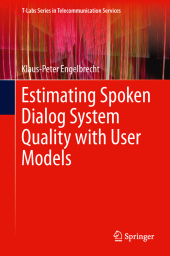 Neuerscheinungen 2014Stand: 2020-02-01 |
Schnellsuche
ISBN/Stichwort/Autor
|
Herderstraße 10
10625 Berlin
Tel.: 030 315 714 16
Fax 030 315 714 14
info@buchspektrum.de |

Klaus-Peter Engelbrecht
Estimating Spoken Dialog System Quality with User Models
2013. 2014. xiv, 130 S. 235 mm
Verlag/Jahr: SPRINGER, BERLIN; SPRINGER 2014
ISBN: 3-642-43191-7 (3642431917)
Neue ISBN: 978-3-642-43191-3 (9783642431913)
Preis und Lieferzeit: Bitte klicken
This book shows how automatic evaluation methods can be applied to Spoken Dialog Systems and integrated in system design. It introduces the MeMo workbench design environment, supporting creation of dialog flows, simulations, summative and formative analysis.
Spoken dialog systems have the potential to offer highly intuitive user interfaces, as they allow systems to be controlled using natural language. However, the complexity inherent in natural language dialogs means that careful testing of the system must be carried out from the very beginning of the design process. This book examines how user models can be used to support such early evaluations in two ways: by running simulations of dialogs, and by estimating the quality judgments of users. First, a design environment supporting the creation of dialog flows, the simulation of dialogs, and the analysis of the simulated data is proposed. How the quality of user simulations may be quantified with respect to their suitability for both formative and summative evaluation is then discussed. The remainder of the book is dedicated to the problem of predicting quality judgments of users based on interaction data. New modeling approaches are presented, which process the dialogs as sequences, and which allow knowledge about the judgment behavior of users to be incorporated into predictions. All proposed methods are validated with example evaluation studies.
MeMo-Usability Workbench.- Evaluation of the Memo User Simulation - Use-Case Inspire Smart Home System.- Detection of Usability Problems Using an Ad-Hoc User Simulation.- Prediction Of User Judgments.- Application of Prediction Models in a Realistic Usage Scenario.


